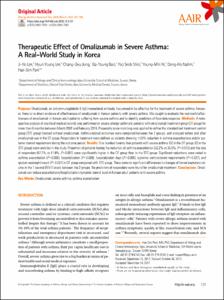KUMEL Repository
1. Journal Papers (연구논문)
1. School of Medicine (의과대학)
Dept. of Internal Medicine (내과학)
Therapeutic Effect of Omalizumab in Severe Asthma: A Real-World Study in Korea
- Keimyung Author(s)
- Jung, Chang Gyu
- Department
- Dept. of Internal Medicine (내과학)
- Journal Title
- Allergy, Asthma & Immunology Research
- Issued Date
- 2018
- Volume
- 10
- Issue
- 2
- Keyword
- Omalizumab; asthma exacerbation; severe asthma
- Abstract
- PURPOSE:
Omalizumab, an anti-immunoglobulin E (IgE) monoclonal antibody, has proved to be effective for the treatment of severe asthma. However, there is no direct evidence of effectiveness of omalizumab in Korean patients with severe asthma. We sought to evaluate the real-world effectiveness of omalizumab in Korean adult patients suffering from severe asthma and to identify predictors of favorable response.
METHODS:
A retrospective analysis of electrical medical records was performed on severe allergic asthmatic patients with omalizumab treatment group (OT group) for more than 6 months between March 2008 and February 2016. Propensity score matching was applied to define the standardized treatment control group (STC group) treated without omalizumab. Asthma-related outcomes were compared between the 2 groups, and analyzed before and after omalizumab use in the OT group. Responders to treatment were defined as patients showing >50% reduction in asthma exacerbations and/or systemic steroid requirement during the outcome period.
RESULTS:
One hundred twenty-four patients with severe asthma (62 in the OT group; 62 in the STC group) were enrolled in the study. Proportion of patients having the reduction of asthma exacerbation (53.2% vs 35.5%, P=0.015) and the rate of responders (67.7% vs 41.9%, P=0.007) were significantly higher in the OT group than in the STC group. Significant reductions were noted in asthma exacerbation (P=0.006), hospitalization (P=0.009), hospitalization days (P=0.006), systemic corticosteroid requirements (P=0.027), and sputum eosinophil count (P=0.031) in OT group compared with STC group. There were no significant differences in changes of forced expiratory volume in the 1 second (FEV1) levels between the 2 groups. No predictors of responders were found for omalizumab treatment.
CONCLUSIONS:
Omalizumab can reduce exacerbations/hospitalization/systemic steroid burst in Korean adult patients with severe asthma.
- Keimyung Author(s)(Kor)
- 정창규
- Publisher
- School of Medicine (의과대학)
- Citation
- Ji-Ho Lee et al. (2018). Therapeutic Effect of Omalizumab in Severe Asthma: A Real-World Study in Korea. Allergy, Asthma & Immunology Research, 10(2), 121–130. doi: 10.4168/aair.2018.10.2.121
- Type
- Article
- ISSN
- 2092-7355
- Appears in Collections:
- 1. School of Medicine (의과대학) > Dept. of Internal Medicine (내과학)
- 파일 목록
-
-
Download
 oak-2018-1172.pdf
기타 데이터 / 322.68 kB / Adobe PDF
oak-2018-1172.pdf
기타 데이터 / 322.68 kB / Adobe PDF
-
Items in Repository are protected by copyright, with all rights reserved, unless otherwise indicated.